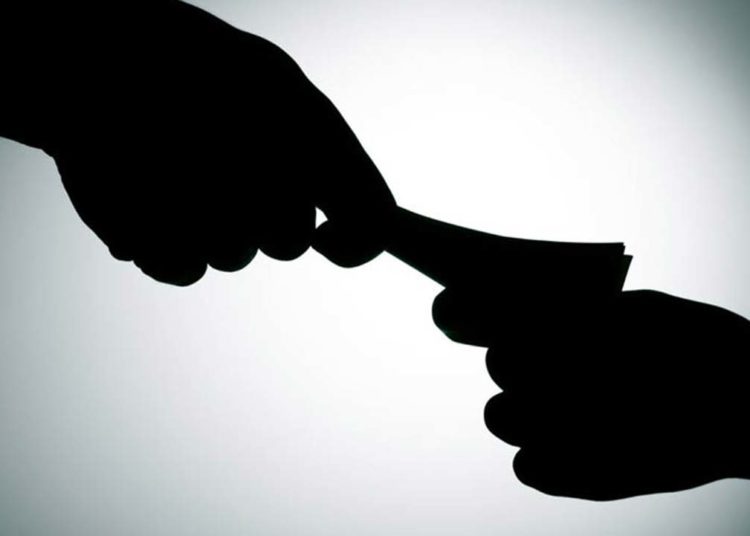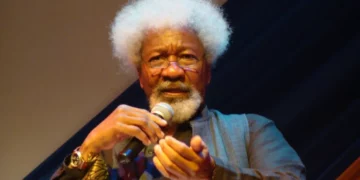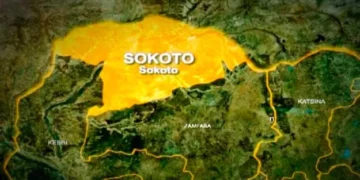The earliest form of corruption was shown in few Shakespearian plays; which he mostly describes how single-minded aristocrats, monarchs, and others abuse their lofty office to gain additional power through unsavory means. This connotes that corruption is no new idea and not peculiar to Nigeria.
It is a global disdain that is synonymous with greed, fraud, swindle, con etc., which leads to accumulation of resources at the expense of an individual or the general populace.
A further description perceives corrupt practices as some kind of cover up or deceptive conduct such as alteration, insincerity, oppressiveness, or violence to men or property.
In a book, titled “Taming the tides of corruption” Omonu 2008, expresses the World Bank’s view of what constitutes corruption.
“It is the abuse of public office for private gains. Public office is abused for private gain when an official accepts, solicits or extorts a bribe. It is also abused when private agents actively offer bribes to circumvent public policies and processes for competitive advantage and profit. Public office can also be abused for personal benefit even if no bribery occurs through patronage and nepotism, the theft of state assets or the diversion of state revenue”.
Reaffirming the World Bank’s assertion, the Asian Development Bank sees corruption as “the behavior on the part of officials in public and private sectors in which they improperly and unlawfully enrich themselves and/or those closely related to them, or induce others to do so by misusing the position in which they are placed”.
However, these definitions are never enough as they are varied definitions in journals, articles and reviews all over the world. But none will succinctly express the idea of what constitutes corruption, except there is an accurate unearthing of historical views and the system that makes it possible in a society.
The colonial mode of government, which was quasi-military, primarily involved constant accumulation of indigenous resources and unequal terms of trade, which spanned over a century and half.
The end of Second World War served as a wakeup call for the Nigerian elites. They challenged the monopoly with which the colonialists suppressed Nigerians. This changed the mode of relationship between the colonialist and the indigenous people. However, this mode of oppression, massive accumulation of resources, and marginalization created a basis for corruption in Nigeria.
The period of decolonization (1952-1960), was key to creating a bedrock for corruption also. Formal/legal authority was been handed slowly to the
Nigerian elites in disregard of the law passed in the Richards constitution of 1946. This slow pace served to create a consolidation of the existing structures that served as a basis for the accumulation of wealth for the colonialist.
The channels of accumulation of wealth includes; export-import trade, extractive and manufacturing industries, banking, insurance, shipping and lots more. The Nigerian elites who were supposed to hold the position of authority in these major institutions where made to serve as representatives and agents (Extroverted consumption-oriented comprador elites). Also, the elected officials who became ministers and chairmen, had their powers subjected to the ultimate powers of the colonialists. The new public offices occupied by the Nigerians served as new avenues for corrupt practices. The laundering of public funds to individual banks was now the order of the day. The enrichment of the political heads and party members from the national treasury became rampant. Corruption permeated all strata of the nation’s life including the very noble.
The Military Coup de tat of 15th January 1966, led by Major Chukwuma Kaduna Nzeogu was targeted at the known issues of misrule, ineptitude and corruption. Though it failed, it ended the first republic democratic experiment. In his speech, Nzeogwu gave the following reasons for their actions:“……..our enemies are the political profiteers, the swindlers, the men in high and low places that seek bribes and demand 10 percent; those that seek to keep the country divided permanently, so that they can remain in office as ministers or VIPs at least, the “tribalists”, the “nepotists”, those that make the country look ‘big for nothing’ before international circles, those that have corrupted our society and put the Nigerian political calendar back by their words and deeds……”
This passionate statement lend credence to the view of the late Nigerian literary icon Chinua Achebe who said, “… Nigeria will have to find a way to do-away with the present system of “god-fatherism” – an archaic, corrupt practice in which individuals with lots of money and time to spare, sponsor their chosen candidates and push them right through to the desired political position, bribing, threatening, and, on occasion, murdering any opposition in the process.”
However, the counter coup of 29th July1966 which led to the emergence General Yakubu Gowon extended the ideals of his predecessors by setting up projects that helped curb corruption to an extent. The Nigerian civil war of 1967, thus created a crack on the on-going process of curbing corruption. There was gross misappropriation of allowances and payments to soldiers that died in the war, lots of cases of inflation of the figures in procuring contracts, looting of millions of pounds sterling from the Bank of Benin, and confiscation of public properties. Furthermore, the Arab – Israeli war (Yom Kippur 1973); triggered the era of petroleum boom in Nigeria; which increased the amount of petrol dollar in the Nigerian treasury and as well escalated unlawful enrichment and budgetary indiscipline.
General Gowon in a statement “… Money is not our problem nut how to spend it”. This statement indicates the scenario of callous looting of Nigerian treasury and a major howler in Nigeria’s history; as they were cases of Nigeria buying jets for poor neighboring countries. The Udoji awards, where everyone working with the Federal Civil Service was paid double of all their salaries and allowances. This award led to the astronomical increase in the earnings of Nigerians. The income of average civil servants rose from 312 Naira per annum to 720 Naira per annum. NOTE: at that moment in Nigeria’s history, the Naira was stronger than the dollar. For instance, 720 Naira was the equivalent of 1200 dollars. The taste and lifestyle of Nigerians began to change. The preference for foreign goods increased at an alarming rate. This brought untold pressure on the value of the Naira with its attendant problem of imbalance of trade.
In the late 70s, the oil boom became oil glut, i.e., the price of crude oil nose-dived in the international market. There was instant drop in Nigeria’s earning from crude oil and more worrisome was the fact that most Nigerians who were farmers had already abandoned farming for white collar jobs. So, Nigeria was earning very little from agriculture. This compounded the country’s woes as she could not finance her national budget. The alternative was to go cap-in-hand to the IMF, World Bank and other Western Financial institutions to borrow in order to finance her national budget. The effects of corruption after this massive inflationary reaction in the economy only led to the increase of allocations through local councils and governments, senatorial districts, states and have not ceased till date.
From 1973 till 1990, several relevant agencies fought corruption and didn’t really achieve any significant progress. To change the course of fighting corruption in Nigeria, the Code of Conduct Bureau and Tribunal Act, Chapter 56 LFN 1990 was enacted. This law was created to maintain a high standard of public morality in the conduct of government business. Also, Olusegun Obasanjo’s administration established the Independent Corrupt Practices and other related offences (ICPC) in the year 2000. Its mandate is to prohibit and prescribe punishment for corrupt practices and other related offenses. It can investigate and prosecute offenders while ensuring that whistle blowers are adequately protected. To strengthen the anti-corruption fight, Obasanjo established the Economic and Financial Crime Commission (EFCC), with the core mandate in preventing, investigating, prosecuting and penalizing economic and financial crimes, as well as enforcing the already enacted acts; the Money Laundering Act (1995), the Money Laundering (Prohibition) Act (1995), The Advance Fee Fraud and other Fraud related offences Act (1995), Failed Banks (Recovery of Debts) and Financial Malpractices in Bank Act (1994), The banks and other Financial institutions Act 1991 and the Miscellaneous Act.
The Perverted Reward System That Breeds Corruption
On a broader note and as a core essence of this literature; the scourge of corruption has eaten deep into all aspects of the economic, social and political system of Nigeria. The faulty system that gives prominence to corruption are the immoral processes/patterns in which various individuals or groups in Nigerian society regard as+ norms and standards in achieving their selfish goals. These immoral acts of primitive accumulation and boycott of the moral standards as well as the use of cutting corners, have been passed on from inception. The fact remains that, the whole society is affected in one way or the other by the general acceptance of moral decadence as a way of life.
The impulse of thieving that the society is pervaded with, makes a corrupt individual sees an opportunity to do right but selfishly chooses to enrich himself. Example: A plumber is given some cash advance to fix pipes in a new building but decides to buy inferior or substandard pipes at a cheaper rate in a bid to enrich himself. In a short while, these pipes will begin to burst, defacing the building as well as endangering lives and property. This scenario doesn’t only tarnish the workman’s image but also gives the owner an extra cost in redoing the job. Another example is a trader who goes to buy goods from China, instead of purchasing quality goods, he opted for low quality goods and end selling to Nigerians at the standard price. A sudden wear and tear occurs as well as loss of value to goods purchased. These two examples takes various forms in the Nigerian society and only goes to show that there is no more conscience in our dealings with one another, there is now an accepted ungodly mode of wealth acquisition, and an unbalanced return of investment at the detriment of the final consumer.
The major aspect of corruption that infringes more on the economy is political/grand corruption. It distorts the real essence of democracy in our society. Nigeria is known all over the world to have men/women blessed with political strategies and smart ideals, ready and willing to vie for political positions but the system is skewed in favor of the corrupt because of the excessive monetization of our political process. They bribe the electorates and electoral umpires or whoever can influence the outcome of the elections, with a goal of continuous primitive accumulation of wealth at public expense.
For instance, the campaign for the office of the governor amount to over a billion naira; an aspirant will have to seek the amount from well-wishers, borrowed from banks and godfathers, knowing fully well that the total salaries and allowances of a governor for four (4) years is not up to 100 million naira. Where is he to source for the remaining money to pay the bank loan or settle godfathers? This opens room for intense misuse of government funds and unnecessary favoritism at the expense of the populace. This analogy clearly expresses why there is the urgent need for the reform of our political structures and processes.
In view of the mutilation of the ethical standard of the Nigerian society caused by political corruption, Mr. Nya – Etok Ezekiel, a public analyst on public policy pointed out in an interview that “the accumulated funds embezzled by corrupt political officials are not used to build houses, schools, hospitals for their families but for the quest of greed and accumulation. This clearly points out that there is total abandon of nation building; these politicians ignore the dilapidated schools, hospitals and houses etc. in Nigeria and spend the huge embezzled funds furnishing those overseas. The effect of this is a total economic and social degradation of the Nation”. The corruption that exists in business transactions or bureaucratic setups cannot be spoken lightly of because it also stands as a major reason for the ethical mutilation of the Nigerian society. The idea of bureaucracy in the first place was to ensure efficiency and curb corruption.
The burden lies on the individual. A popular Nigerian aphorism says, “A tree cannot make a forest” but I say a tree is part of the forest; to treat the infestation of this country in terms of corrupt practices, we must turn away from demanding and receiving bribe before files are treated in public offices. The politician must accept the people’s verdict without trying to influence the results of an election. It also involves the police officer that shunning bribe presented to him/her by criminals and ensure that they are punished accordingly. We can go on and on, but it is a simple analogy to note that the task of combating corruption starts from the individual consciousness to do the right thing.
However, the leadership must play a vital role in aiding this smooth transition to a less or corrupt-free society by displaying high levels of transparency in all its dealings. To ensure that the ends of government, which is a better life for the common man is achieved. Ensuring the reformation of political process because the society’s ills are hinged on the effects of political corruption. All corrupt individuals at all levels must be brought to book. Stringent penalties must be administered depending on the degree of corrupt practice this will no doubt serve as deterrent to others. The family which is the first institution in every society, and schools should educate the children appropriately, about the ills of corruption and its effect to future generations. The level of lack and unemployment should be taken as a priority by government to reduce corrupt tendencies in Nigeria. No society remains perpetually underprivileged, fraudulent, and recessed forever; so the only way is moving forward as a nation.





